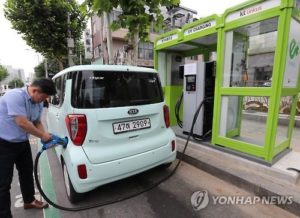
Early Pilot
The Ministry of Environment (MOE) has completed building 180 high-speed charging stations for public use to expand distribution of electric vehicles (EV). This initiative is aimed at reducing driver’s concern over availability of charging stations in areas with high concentrations of EV adoption. The public charging stations will be provided for free during a pilot period; after 2014 a charge will be assessed for using the stations. This project has been implemented simultaneously with generous government incentives for purchasing electric vehicles. The MOE has offered subsidies of 15 million won ($13,900 USD) to those purchasing any class of EV.
Considering the average vehicle driving distance on one charge, the number of distributed EVs, and accessibility to charger, the MOE prioritized installation of chargers at public buildings, public parking lots, large supermarkets and major tourist attractions.
Utility Pole Charging Pilot in Busan
Korea's state-run power supplier has devised a way to use utility poles as charging stations for electric vehicles, drastically cutting installation costs, its officials said Wednesday.
Working with an idea submitted by one of its employees, the Korea Electric Power Corp. said it will conduct a trial test within this year in the southeastern city of Busan. A memorandum of understanding will be signed with the city on July 28, officials said.
The pole-mounted EV charger, being developed from May, would reduce the installation cost normally reaching 40 million won ($35,000) per station to maximum 2 million won, and also eliminate the cost of buying the land to set up the stations, officials said. KEPCO would only need to pay for the charging equipment, approximately 30 million won each, they said.
Price for use will be about the same as at other charging stations, with three different charging speeds available. The equipment will include connecting cables, battery charger controller, LED lighting and a black box.
KEPCO hopes to install the chargers at some 30,000 utility poles nationwide that are close to parking lots, starting with a trial operation at four locations in Busan.
"This is the first attempt ever to use utility poles as EV charging stations," Jin Bong-geon, the employee of KEPCO's Busan-Ulsan regional office who proposed the idea, said. "The most unique feature of it is that people can stop by as they would at a convenience store to get their EVs recharged."
The environment ministry and telephone booth operator KT Linkus together started offering EV charging services at public phones from earlier this month. (Source: Korea Herald)
Charging Station Network in Seoul
South Korea will spend about 200 billion won (US$180.3 million) in 2016 to sharply expand electric vehicle charging infrastructure nationwide as part of its efforts to foster the eco-friendly sector as a new growth engine, the trade ministry here said Tuesday.
Under the plan, led by the Korea Electric Power Corp., the country's sole power supplier, the government will build 150 on-street stations by November to accommodate 300 super chargers that are available for privately owned electric cars and taxis for a fee. It will also install about 30,000 regular chargers at apartment complexes across the nation, according to the Ministry of Trade, Industry and Energy.
Seoul and Jeju Island will each house 60 charging points to run a total of 240 super chargers, with the remaining 60 super chargers to be built at 30 stations in other parts of the country, the ministry said, adding the fee will be determined later.
It will also establish five flagship charging stations in Seoul for comprehensive one-stop services from electric car-related businesses such as carmakers, rent-a-car firms and repair shops.
KEPCO will install 30,000 regular chargers at some 4,000 apartment complexes in the country by the end of this year to help electric car drivers use their machines more conveniently.
‘South Korea has put a policy priority on promoting the electric vehicle sector as a key export item,’ Trade Minister Joo Hyung-hwan said in a groundbreaking ceremony for the first super-charging point in Seoul. ‘At the same time, the public sector is moving swiftly to expand infrastructure for electric cars.’ The first super charging station in Seoul will be built near the Sangam World Cup Stadium. (source: Korean Herald)
Other Korean Initiatives
Also, KEPCO and other power-related public firms such as Korea Hydro and Nuclear Power Co. will buy a combined 1,100 electric cars worth 44 billion won by 2023 in a way to bolster domestic sales of the product.
South Korea will cut electric car charging fees by half later this year as part of its efforts to promote the sector as a new growth engine, the trade ministry here said Monday.
Electric vehicle owners will pay 60,000 won (US$53) to super-charge their cars at on-street public charging points starting from September, down from the current 120,000 won, according to the Ministry of Trade, Industry and Energy.
The price for normal charging will also go down to 9,500 won from 19,000 won, the ministry said.
The price cut is a follow-up to the South Korean government's long-term plan unveiled earlier this month to transform the country's energy sector into an eco-friendly one.
The electric vehicle industry is at the top of the supportive program, with the country aiming to export an annual 200,000 units of the eco-friendly car by 2020 with a market share of 10 percent.
In order to achieve the goal, the government will help battery companies conduct R&D projects and set up nationwide electric car charging stations, while electric car buyers will get more financial incentives such as 14 million won in state subsidy. (Source: Yonhap News, Gas2)